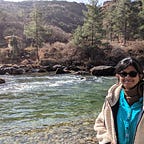Something I’ve learned early on about my anxiety, is that he’s like a dog that’s sleeping with one eye open. Resting, but alert. Waiting quietly for an ugly thought to surface, or just a chance to make ugly any thought that surfaces. That’s when it pounces.
It takes maybe a second, nay, a millisecond of unpleasantness: my anxiety gets to work instantly, inflating it like it is a balloon that will never pop. Before I know it, everything is blown completely out of proportion.
This pattern hasn’t changed since I first noticed it. But my journey over the past couple of years did change me in one way: in those days, I believed the ugliness of those thoughts to be my inner essence. Today, yes, I still watch my anxiety manifest helplessly, but I do that without owning those thoughts.
I know that the outcome doesn’t feel very different. But there is solace in being able to dissociate, and in understanding that the suffering is coming from something in your head that’s not you. Knowing this has helped reduce “anxiety guilt”, and feelings of being weak, that I have carried ever since I first became conscious of suffering from anxiety.
Having anxiety is, to that end, not very different from being diabetic. No one chooses to subject themselves to either, and yet there is greater ownership for cause in the former than in the latter.
Getting rid of my anxiety altogether has been a different fight entirely. I’ve taken pills for it. I have tried meditations. I have tried hypnosis. All to force myself to not feel anxious. To force myself to feel confident, free, and fearless. And they did work … Temporarily. The feelings of dread, with all their causative burdens, always came back. I wanted so badly to be rid of it. Who wants to live with a thing that cripples you from engaging in the simplest, most mundane everyday activities?
This intense desire to rid myself of anxiety led me to a situation where, every time I had a panic attack, I not only suffered the minutes it lasted, but also the next 24–48 hours, since i would spend them feeling extreme guilt and sadness. “How dare I suffer from an attack again?!” “How dare I not do enough during the non-anxious hours to prevent another attack?!” “How dare I let someone else witness it?” “How dare I subject them to worry?”
I would then enter a phase where I actively hunt for readings, or books, or videos, searching for something new to try, or some new perspective, that would magically evaporate my anxiety. “Maybe now I will be back to normal”.
This was my anxiety routine for most of 2017–2018. I felt no compassion for myself. I gave myself no kindness. I just built myself a nice, big, never-ending reservoir of self-hate.
I lived very carefully during that time. I identified and avoided any and all potential triggers. I did not want to experience the embarrassment associated with having an attack in front of people. The feeling of not having any control over myself was nasty. It felt uncivilized. How could I lose the ability to present myself to the world in a non-offensive, palatable fashion, where no one needed to tip-toe around me anymore, or be afraid of setting me off?
One beautiful December night changed it all. It was the day of Telangana State Elections, on December 7th, 2018. My worst fears came true that night: I had an attack at a party that was mostly strangers. Remember that reservoir of self-hate? All my rational thoughts drowned in it.
The attack lasted hours. The only thing I remember feeling is wanting to disappear. To be gone. How else would the hatred stop? I had only enough lucidity to call on an old friend and get a ride home.
That night changed me, from indulging in excessive paranoia and carefulness, to absolutely not giving a fuck about any of it.
What shifted in me that night? My worst case scenario had occurred and I had survived. I was still functional. Of course there was guilt and a bunch of apologies to all those who had witnessed it. But just like that, I felt that I could handle it all.
That feeling lasted about two months. I went out a lot. I did things that would otherwise scare me. Unbeknownst to me, I had become comfortable with my anxiety. And just like that, a big part of the burden was gone.
I guess I was ready for wisdom that would shift my relationship with anxiety from one of fear to one of acceptance. Maybe even listening to it, and honouring it from time to time. It helped me stay more lucid while experiencing an attack than was ever possible before. A dear friend sent me an activity workbook that taught me to empathize with my anxiety. I soon inundated myself with resources that encouraged me to accept my anxiety, to be present with it, and to listen to it.
The way to heal for me has been in being patient with my anxiety, and as compassionate to myself as humanly possible. It has been in capturing moments to express love towards myself and to prolong those moments by immersing myself in them. I’ve learned that love truly does make it difficult for self-hate to thrive.
I admit, it is still hard but now I have help, a therapist. And it took being ready for help to find one that I stuck with. The reservoir of self-hate has much emptying to be done. But I see in myself more hope, more engagement with life, and infinitely more possibilities for having accepted it. For all that, I am grateful.
